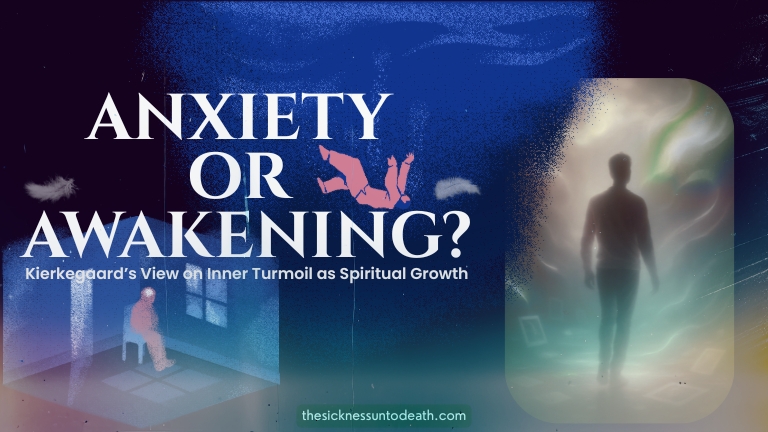Examine how Kierkegaard frames anxiety not as a flaw, but as an essential step towards spiritual awakening and selfhood.
In modern life, anxiety is usually something we try to avoid, numb, or fix. It’s treated as a flaw, a malfunction of the mind. And while clinical anxiety is real and deserves proper care, Søren Kierkegaard offers a radically different take—one that reframes inner turmoil as something more than a mental health issue.
To Kierkegaard, anxiety isn’t a sign that something’s wrong. It’s a sign that something important is happening.
He calls it “the dizziness of freedom.” And in that phrase, he reveals a powerful truth: anxiety might not be our enemy. It might be the beginning of awakening.
The Gift Hidden in Anxiety
In The Concept of Anxiety, Kierkegaard explores the tension we feel when faced with possibility. When we stand at a crossroads, realising we are free to choose our path, we often don’t feel empowered—we feel paralysed. That’s anxiety.
“Anxiety is the dizziness of freedom, which emerges when the spirit wants to posit the synthesis and freedom looks down into its own possibility.”
In simpler terms, anxiety is what happens when we realise our own potential—and the terrifying responsibility that comes with it.
Far from being just a symptom to manage, Kierkegaard sees anxiety as a spiritual signal. It tells us we are standing on the threshold of something deeper: the call to become who we truly are.
From Avoidance to Awareness
Most of us are taught to escape anxiety—scroll past it, bury it in busyness, drown it in distractions. But Kierkegaard challenges us to do the opposite. Rather than running from anxiety, he invites us to face it. To ask what it might be pointing us toward.
Anxiety, he says, is not simply about fear. It’s about possibility. The awareness that we are free to choose faith, purpose, authenticity—and also free to reject them.
This awareness can be painful. But it’s also the very moment we begin to wake up. Spiritual growth, according to Kierkegaard, doesn’t begin in peace. It begins with trembling.
Anxiety and the Path to the Self
So what does this mean for our inner lives?
Kierkegaard believed that the self is not something we simply are, but something we must become—through choices that align us with truth, and ultimately with God.
Anxiety is part of this process. It exposes our illusions. It forces us to confront the fact that we are not yet whole. That something in us is restless, longing, reaching for a meaning that the world alone cannot give.
Rather than seeing this as a flaw, Kierkegaard sees it as a mark of the eternal within us. It is, in his words, the precondition for faith.
“He who is educated by anxiety is educated by possibility.”
When Anxiety Becomes Awakening
If you’ve ever felt anxious in moments of change, decision, or uncertainty—you are not broken. You are, perhaps, exactly where you need to be.
Kierkegaard’s wisdom helps us see that anxiety may be a doorway. Not to despair, but to transformation.
This doesn’t mean anxiety is easy. It can be overwhelming, disorienting, even paralysing. But by naming it for what it is—a sign of freedom, a pull toward purpose—we can begin to move through it rather than stay stuck within it.
Final Thoughts
In an age that medicates, distracts, or shames anxiety, Kierkegaard offers a more honest—and hopeful—view. Anxiety isn’t a detour on the spiritual path. It is the path.
To feel anxiety is to be human. To listen to it, and let it guide you toward faith and selfhood, is to begin awakening.
So the next time anxiety rises within you, consider this: it might not be a warning sign. It might be an invitation.
An invitation to grow, to choose, to become.

